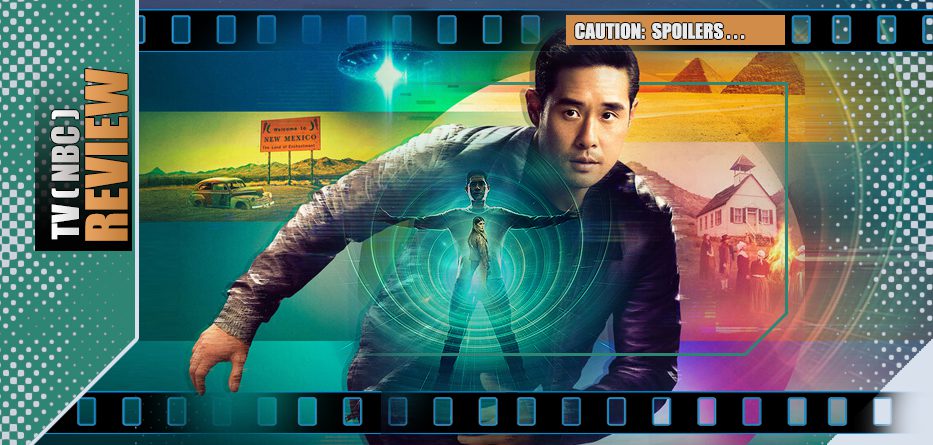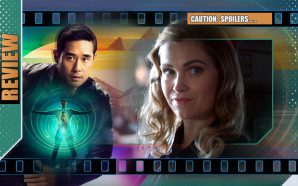It’s 1987, somewhere over Russia. After sorting out the timeline and saving Addison, Ben expected to Leap home, but instead he finds himself aboard a secret flight somewhere over Russia and inhabiting the body of ‘Perez’, part of a team assigned to get a very special crate to safety without alerting anyone on the ground thousands of feet below them. It doesn’t work out – and with the plane hit, the team is forced to crashland. But now they’re faced with a dilemma – can they protect the crate and themselves, when they don’t even know what’s in the crate or whether help is coming?
And with Ben not receiving any communications from back at the Project, is there any chance of anyone getting back home?
*spoilers*
The first episode of Quantum Leap‘s second season – one of the first renewed shows to come back to screen as it started to bank new episodes in production ahead of the WGA and SAG strikes – is an interesting beast in the sense that it really doesn’t answer the cliffhanger that the final episode of the first run left us with and it barely features the usually strong supporting cast. Oh, we immediately know that Ben didn’t leap home (which would have somewhat curtailed the story) and we only see some of our regular contemporary cast courtesy of Ben having memories/flashbacks, but if you want to know why Ben didn’t return the Project and what may have happened back there in his absence, you aren’t even going to get a hint until the closing scene which will likely raise more questions than it answers.
Instead, Ben is in 1978, somewhere over Russia and now in the body of a low-level operative named Perez. The behind-enemy-lines mission gives us a kind of disposable A-team – all quirky and earnest and conspiratorial to different degrees. They’ve been working together a while, enough time to both trust each other and be able to annoy each other. The team also brings us Ellen (played by Manifest‘s Melissa Roxburgh (Manifest), Curtis (Midnight, Texas‘ Francois Arnaud), Ronny (Blindspot’s Aaron Abrams) and Enock played by P.J. Byrne (The Boys). (Is it just me or are their scenes where Abrams looks uncannily like a young Scott Bakula?) They’re all entertaining enough to believe (in a general sense) as a team who might die for each other but really don’t want to – all misfits sidelined by the military for various reasons. When the plane is struck and goes down, the team only has itself to rely on and Ben quickly realises that there’s no communication coming from the Quantum Leap project itself (Has something happened to them, has something happened to him?). We’ll have to wait a little to find out – but it means that Perez/Ben instigates a lot of the solutions himself. His Swiss-cheesed memory has become a little less… well, caca… and the useful memories he can draw upon basically help him from going into a full-scale panic and also gently remind us of the over-all mission statement of the series.
The solutions Ben comes up with are at least dynamic and draw ever so lightly on some Indiana Jones references. That mysterious crate that the team are supposed to protect with their lives… well, despite conjecture from the team, it’s not an Arc of the Covenant relic (it’s much less exciting) and the famous sandbag/statue switch gets a battlefield swerve. While pressure-mines are unlikely to respond in the real world quite the way they do here, the gradual shift in weight – using the whole team taking their turn on the ‘plate’ – certainly works within the idea of teamwork in the story. Visually the story works, complete with some series-opener budget-blowing explosions and some impressive miniature-work that you’ll likely miss at the speed things keep moving.
But what about the ‘Leaping’ aspect? Yes, we learn in the final moments that while Ben may have Leaped straight from saving Addison back at the Project to the under-the-radar mission in 1987 in what seemed like just a few seconds, for the team back home it’s been three years. When Ian (and not Addison?) appears, he says that they thought Ben was likely dead and in that time the project has been dismantled, that ‘everything is different‘. It does have some implications – while time between Leaper and Observer wasn’t always consistent in the original show, the idea that the time differential could be so different raises some creative questions.
Hopefully, we’ll get some context to what those changes are next week.

- Story8
- Acting8
- Direction8
- Production Design / VFX8












